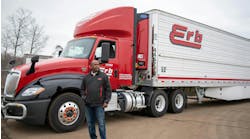A presidential mandate to improve truck fuel economy was accomplished with the stroke of a pen last month, but figuring out how to measure that improvement will be far more complicated. And if regulators aren’t careful, those measurement standards could actually end up producing trucks that consume more fuel in real-world operations than today’s vehicles, according to researchers and industry engineers.
Automobile manufacturers are held to corporate average fuel economy (CAFÉ) standards based on simple miles-per-gallon measures, but mpg “is not the appropriate measure for MHDVs (medium- and heavy-duty vehicles), since these vehicles are designed to carry loads in an efficient and timely manner,” according to the National Research Council, which created the report motivating the recent presidential mandate. “A partially loaded tractor-trailer would consume less fuel per mile than a fully loaded truck, but this would not be an accurate measure of the fuel efficiency of moving goods,” the group’s panel of researchers said.
The “most meaningful metric of fuel efficiency will be in relation to the work performed, such as fuel consumption per unit payload,” NRC said. While a ton-per-mile measure might work for linehaul trucks hauling freight, how do you measure fuel consumed by work performed for a refuse collection truck, or a utility service vehicle, or any of the other dozens of application specific operations using trucks?
“I don't envy regulators in trying to put together [fuel-economy rules],” said Anthony Greszler vp of government and industry relations for Volvo Powertrain, the engine and component supplier for Volvo and Mack Trucks in North America. “If you standardize [on one measurement], you’re going to drive technologies into situations where they won’t work. So how many applications do you need to consider in a regulation, but not have so many that it’s impractical? That’s a tough task and it has to be done carefully to deliver fuel efficiency but not drive high costs that don't deliver in certain applications.”
The government regulator charged with creating those standards, the National Transportation Highway Safety Administration (NHTSA), “will have to define duty cycles well and then regulate by [vehicle] segment,” said Garrick Hu, who helped write the NRC report and who has extensive experience in advanced engineering development with major truck manufacturers and component makers. “It’s the only reasonable thing they can do. It won’t be simple metric like mpg, but will somehow have to reflect efficient use of fuel.
“NTHSA will have to segment the market, construct a duty cycle for each, and then create a load-specific measure of fuel consumption -- some measure of work achieved with that fuel in that duty cycle,” Hu told Fleet Owner. “It might be ton-mi./gal for highway trucks, for example. Otherwise you’d end up with a half empty truck that gets better mpg, but is less efficient in terms of work.”


